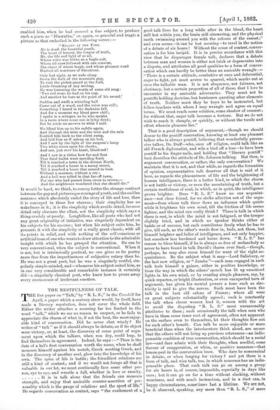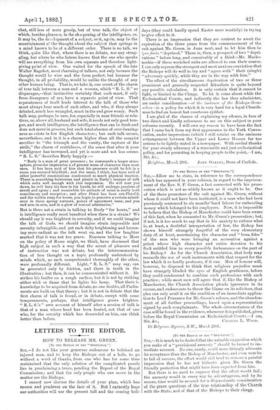THE RESTFULNESS OF TALK.
THE fine paper on "Talk," by " R. L. S.," in the Cornhill for April, a paper which a century since would, by itself, have made a literary reputation, does not cover the whole field. Either the writer attaches a meaning far too limited to the word "talk," which we see no reason to suspect, or he fails to appreciate the charm of what is, if not the best, the most enjoy- able kind of conversation. Did he never chat wisely ? He writes of " talk " as if it should always be debate, as if its object were victory, or, at least, the discovery of some point of argu- ment upon which the talkers, when run dry, could leap, to find themselves in agreement. Indeed, he says :—" Then is the date of a lad's first conversation worth the name, when he shall measure himself against his match, Greek meeting Greek, and in the discovery of another soul, glow into the knowledge of his own. The spice of life is battle ; the friendliest relations are still a kind of contest; and if we would not forego all that is valuable in our lot, we must continually face some other per- son, eye to eye, and wrestle a fall, whether in love or enmity.
It is in talk alone that the friends can measure strength, and enjoy that amicable counter-assertion of per- sonality which is the gauge of relations and the sport of life." He regards conversation as contest, says "the excitement of a
good talk lives for a long while after in the blood, the heart still hot within you, the brain still simmering, and the physical earth swimming around you with the colours of the sunset;" and even seems—it can be but seeming—to revel in the notion of a debate of six hours ! Without the sense of contest, conver- sation is for him insipid. It is in precise accordance with this view that be disparages female talk, declares that a debate between man and woman is either not brisk or degenerates into a dispute, and attributes all good qualities to a form of conver- sation which can hardly be better than an amicable wrangle :— "There is a certain attitude, combative at once and deferential, eager to fight, yet most averse to quarrel, which marks out at once the talkable man. It is not eloquence, not fairness, not obstinacy, but a certain proportion of all of these, that I love to encounter in my amicable adversaries. They must not be pontiffs holding doctrine, but huntsmen questing after elements of truth. Neither must they be boys to be instructed, but fellow-teachers with whom I may wrangle and agree on equal terms. We must reach some solution, some shadow of consent ; for without that, eager talk becomes a torture. But we do not wish to reach it cheaply, or quickly, or without the tussle and effort wherein pleasure lies."
That is a good description of argument, —though we should demur to the pontiff reservation, knowing at least one pleasant talker who is always pontiff, believing that wonderfully persua- sive talker, Dr. Duff—who, once off religion, could talk like an old French diplomatist, and wile a bird off a tree—to have been pontiff to his finger-nails, and holding that "literary pontiff" best describes the attitude of Dr. Johnson talking. But then, is argument conversation, or rather, the only conversation ? We maintain that it is not, and that while, as regards the formation of opinion, argumentative talk deserves all that is said of it here, as regards the pleasantness of life and the brightening of human intelligence, there is a better kind, in which the charm is not battle or victory, or even the ascertaining of truth, but a certain restfulness of soul, in which, as in quiet, the intelligence grows brighter. Does "R. L. S." know no one acquaint- ance—not close friend, for we strike affection out of the argu- ment—from whose talk there flows an influence which quiets while it brightens his own mind, till the friction of life seems lighter, and the mind can really think P There is talk in which there is rest, in which the mind is not fatigued, or the temper slightly tried, and in which no speaker thinks either of battle or of success, but each contributes freely what he has to give, till each, as the other's words flow in, feels, not them, but himself brighter and fuller of intelligence, and not only happier, but somehow less burdened and borne down. "H. L. S." has reason to bless himself, if he is always so free of melancholy as never to have found in talk David's charm over Saul,—though, perhaps, he may also curse himself for want of the right ac- quaintance. Be the subject what it may—Lord Salisbury, or the last new religion, or "Jumbo "—each man engaged in such talk feels himself a gainer, either in positive knowledge, or from the way in which the others' speech has lit up unnoticed lights in his own mind, or by creating simple pleasure, say, by quick repartee, or bright illustration, or even unexpected turn of argument, has given his mental powers a tone such as elec- tricity is said to give the nerves. Such must have been the talk in the best old salons of France; where all were on great subjects substantially agreed ; such is constantly the talk when clever women lead it, women with the art to avoid the disputing "R. L. S." most unreasonably attributes to them ; such occasionally the talk when men who have in them some inner root of agreement, often not apparent on the surface even to themselves, let their thoughts flow out for each other's benefit. Can talk be more enjoyable or more beneficial than when the interlocutors think aloud, are secure that the others will not bring up previous utterances—an indis- pensable condition of true conversation, which should be a social law—and dare admix with their thoughts, when needful, some flavour of exaggeration, or whim, or positive nonsense—that lemon-peel in the conversation brew. Who dare be nonsensical in debate, or when longing for victory ? and yet there is a form of talk, and wise talk, too, in which nonsense has an indis- pensable place. That such talk can go on among a group for six hours is, of course, impossible, especially in days like ours ; but it can go on for a time without slacking, without weariness, and with much instruction, and in a duet can, in happy circumstances, sometimes last a lifetime. We are not, be it observed, speaking, any more than "H. L. S.," of mere
chat, still less of mere gossip, but of true talk, the object of which, besides pleasure, is the shaipening of the intelligence, or, it may be, the de7e lopment of a subject, or it, ag lin, may be the ascertainment of the thought about the subject that springs in a mind known to be of a different order. There is no talk, we think, quite like that, where there is no debate, nor any strug- gling, but where he who listens knows that the one who speaks will see everything from his own separate and therefore light- giving point of view. One waited for the speech of the late Walter Bagehot, most charming of talkers, not only because the thought would be wise and the form perfect, but because the thought., in all probability, would be unlike the thought of any other human being. That is, we take it, one secret of the charm of true talk between a man and a woman, which "R. L. S." so disparages,—that instinctive certainty that each must, if only from divergence of sex, have a separate point of view. That separateness of itself lends interest to the talk of those who must always hear much of each other, and who, if they always debated, much less wrangled, must in the end grow weary. Such talk may, perhaps, be rare, for, especially in near friends or rela- tives, or, above all, husband and wife, it needs not only good tem- per, and much intelligence, the intelligence that can be fresh and does not move in grooves, but such total absence of over-bearing- ness as exists in few English characters ; but such talk occurs, nevertheless, and in it is a charm higher than all the essayist ascribes to "the triumph and the vanity, the rapture of the strife," the charm of restfulness, of the sense that after it your intelligence has increased, and yet is more and not less serene. " R. L. S." describes Burly happily :—
" Burly is a man of great presence ; he commands a larger atmo- sphere, gives the impression a of grosser mass of character than moat anen. It has been said of him that his presence could be felt in a room you entered blindfold ; and the same, I think, has been said of other powerful constitutions condemned to much physical inaction. There is something boisterous and piratic in Barly's manner of talk which suits well enough with this impression. He will roar you down, he will bury his face in his hands, be will undergo passions of revolt and agony ; and meanwhile his attitude of mind is really both conciliatory and receptive ; and after Pistol has been out-Pistol'd, and the welkin rung for boars, you begin to perceive a certain subsid- ence in these spring torrents, points of agreement issue, and you end arm-in.arm, and in a glow of mutual admiration."
But is there not a strain in talking to Burly "for hours," and
is intelligence really most benefited when there is a strain ? We should say it was brightest in serenity, and if we could imagine the talk of Gods, we should imagine strain impossible and serenity infrangible, and yet each deity brightening and becom- ing more radiant as the talk went on, and the low laughter marked that it was not too grave. Erasmus talking to More on the policy of Rome might, we think, have discussed that high subject in such a way that the secret of pleasure and of instruction was not debate, but the intercommunica- tion of free thought on a topic profoundly understood by minds which, as each comprehended thoroughly of the other, were profoundly different. Light, " R. L. S." may say, can be generated only by friction, and there is truth in the illustration ; but then, it can be communicated without it. He strikes his lucifer on a rough surface, but it is not by striking 'either wick or flame that he lights his lamp. That there is knowledge to be acquired from debate, no one doubts, all Parlia- ments are built on that theory ; but it is not in debate that the first charm of talk is found, or in debate, except with some temperaments, perhaps, that intelligence grows brighter.
" R. L. S.'s " own account of himself after a session of talk is that of a man whose head has been heated, not that of one who, for the serenity which has descended on him, can think better than before.















































 Previous page
Previous page